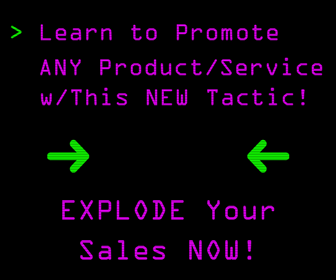The products and services you provide will either create success or hold you back. This is what makes selecting the right business for yourself, your lifestyle and your expectations extremely important. Yet this is only half the battle, the other half, building strong lifelong relationships with your suppliers and customers.
Regarding your suppliers, here are a few tips on how to build solid relationships with them:
Work for Mutual Benefit: A really good supplier can steer you toward the best-selling goods and services — or those with the highest potential — and thereby increase your sales. What’s more, if you’re able to build and sustain relationships with suppliers that are also profitable for them, they’re more likely to work to make sure your business does well too. Rather than risk losing you, they’ll likely come to your aid if your customers ever make difficult demands. A relationship based on mutual trust and reliability is in the interest of everyone. It’s also important to keep in mind that, just like you, suppliers are in the business of making money. So if you give them a hard time with their bills, ask them to continuously discount goods and services, or don’t pay them on time, they may decide to stop working with you — just as you might decide to break it off with a client that poses too many headaches for you.
Price Isn’t Everything: When negotiating with suppliers, price should never be the sole determining factor — because a low price is of little use to you in the long run if your supplier doesn’t deliver on time, has payment issues, or delivers low-quality goods and/or services. In addition to price, elements you should consider include delivery efficiency, quality and maintenance of goods and services, accepted methods of payment, and any extra services they may offer. If you’re able to determine how crucial your company’s orders are to a supplier, that can give you a good deal of leverage in the negotiating process. However, driving too hard a bargain may ultimately result in bad feelings and a sour relationship going forward.
Before you enter into a relationship, be sure to do some research into a prospective supplier’s history. Just as you would with potential customers asking for credit, run a background check and ask for references. Find out if the supplier’s other clients are satisfied with their products and/or services and if there’s any history of delivery default, delivery delays, poor-quality materials, etc.
Then be certain to make your needs and expectations very clear regarding all your requirements, from price to quality and quantity to delivery time and acceptable payment methods. As always, stating things clearly in writing from the start will protect the interests of both parties in the long run.
Before working towards and build up a relationship with any supplier, make sure to take the time to do some research and background checks. This will save you time, money and massive headaches down the line.
How did you build a solid relationship with your supplier?
Image Source: Aidan Jones on Flickr
CHALLENGE Yourself to Profit!
Free Download: Build Your Profit-Generating Online Business With This Free Blueprint
Sign Up, follow the easy steps and You'll get the tactics, strategies & techniques needed to create your online profit stream. It's free!



